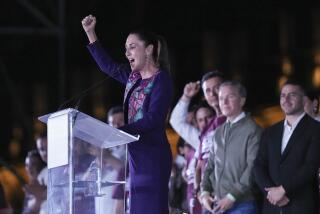MEXICO’S FINANCIAL UPHEAVAL : Finance Chief Scores Points on Wall Street
MEXICO CITY — The country’s new finance minister appeared to have scored a touchdown Thursday for his beleaguered government in a crowded meeting with international investors in New York, but there was sobering news for Mexican citizens.
In a high-profile appearance before hundreds of skeptical Wall Streeters, Guillermo Ortiz sought to assure them that the Mexican government is on the right path in dealing with its monetary crisis and offered new details on its privatization plans.
Afterward, the peso rose against the dollar and Mexican stocks edged upward. Fund managers who went in skeptical said they left feeling better about President Ernesto Zedillo’s attempts to regain control of the economy.
“Overall, I’m impressed,” said Robert Meyer, portfolio manager at Morgan Stanley Asset Management, which has $1 billion invested in Latin American stocks. “We’re buyers of Mexico.”
A leading Mexican economist, Rogelio Ramirez de la O, citing prior confusion at top government levels, said: “Given the performance Zedillo has shown in previous days, this is remarkable. Perhaps Ortiz is turning the tide.”
After days of sharp losses, the Mexican stock exchange index finished up 3.23 points Thursday at 2,273.10. The peso regained 15 centavos, closing at 5.4 to the dollar.
“We are convinced it’s going to work,” Ortiz told investors who filled a conference room at the Pierre Hotel. “We know what the issues are and we’re working on them.”
Stanford-trained economist Ortiz was named to the key finance post last week after the new Zedillo government provoked a crisis of confidence among investors and panicked citizens with an unexpected devaluation of the peso.
Shortly before Thursday’s appearance, the Mexican government released a new set of economic projections that underscored the economic pain soon to face the Mexican people.
The government cut its economic growth projections to 1.5% from 4% and raised its target average inflation rate to 19% from 5.4%. But it said the current account deficit will be slashed in half, largely by cutting imports while increasing exports.
The government also said further privatization of government-owned companies will raise about $13 billion. An estimated $6 billion is expected to come from the sale of electric power plants--about three-quarters of them by year’s end, Ortiz told investors.
“That seems a little aggressive, but these plants are very profitable and attractive,” said Victor Herrera, director of the Standard & Poor’s office in Mexico.
The government also predicted that the peso will settle in at an average exchange rate of 4.5 to the dollar during 1995--down from 3.47 before the Dec. 19 devaluation but above the current 5.4.
That provoked skepticism among investors because the growth projection and inflation targets are based on that rebound by the peso.
“They will have growth if the peso is at 4.5 and inflation” is stable, said one large institutional investor. “Nobody I have talked to thinks that will happen.”
Ortiz reiterated to investors that government oil exploration and refining operations, a politically powerful entity in Mexico, will not be sold. The government has previously attempted to sell some interest in petrochemical plants.
In all, the government said it expects the economy to receive $6 billion to $8 billion in foreign investment this year and another $1 billion brought in from abroad by Mexicans. Mexican importers will also be encouraged to obtain financing from their suppliers, which, in effect, would bring in another $5 billion from abroad.
Ortiz, respected by the financial community, was accompanied to New York by two well-known Mexican business leaders: Claudio X. Gonzalez, general director of Kimberly Clark’s Mexican subsidiary, and Carlos Slim, chairman of Telefonos de Mexico.
“For the first time, there is somebody confident on top of the situation, and that’s what we needed to see,” said Juan Carlos Garcia of Salomon Brothers Inc., one of the analysts who met with Ortiz.
* WORST FEARS
In Mexico, inflation is the price of devaluation. A12
More to Read
Sign up for Essential California
The most important California stories and recommendations in your inbox every morning.
You may occasionally receive promotional content from the Los Angeles Times.










